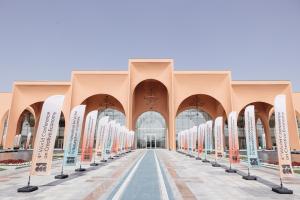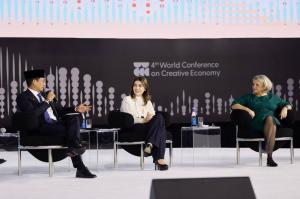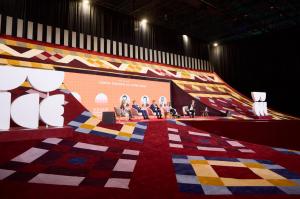Global Leaders Shape the Future of Creative Industries at the IV World Conference on Creative Economy
The Uzbekistan Art and Culture Development Foundation (ACDF) welcomes the Creative World to Tashkent, Uzbekistan for the IV World Conference on Creative Economy
TASHKENT, UZBEKISTAN, October 7, 2024 /EINPresswire.com/ -- Friday, October 4, 2024, Tashkent, Uzbekistan: Over 14,640 senior officials, business leaders, creative entrepreneurs, and students from 73 countries attended the 4th World Conference on Creative Economy (WCCE) in Tashkent, Uzbekistan from 2-4 October, to accelerate alignment on the future of creative industries. As the first time the conference was held in Central Asia, the unprecedented levels of participation demonstrate the importance of the creative economy on the world stage and the region’s leadership in fostering its growth.“As we wrap up the first World Conference on Creative Economy held in Central Asia, we are incredibly proud of what we’ve accomplished for the region and global economies worldwide,” said Gayane Umerova, Chairperson of the Uzbekistan Art and Culture Development Foundation. “At home, the new law on Creative Economy will stimulate creative entrepreneurship and help bring Uzbek artistry and ingenuity to the world. While at the global level, the agreements signed at the WCCE signal a transformative approach to cultural heritage preservation and socioeconomic opportunity.”
Uzbekistan Prime Minister Abdulla Nigmatovich Aripov addressed the conference to welcome the world to Tashkent and unveil Uzbekistan’s new law on Creative Economy. The new law will increase investment in traditional and emerging creative industries within Uzbekistan, as well as advance the country’s collaboration with nations and global organisations across the world. The announcement builds on the country’s bold and visionary development reforms, including the Development Strategy of New Uzbekistan for 2022-2026.
Over the three-day conference, 130 speakers from Sheikha Al-Mayassa bint Hamad bin Khalifa Al Thani, Chairperson of Qatar Museums, to Aaron Rasmussen, co-founder of MasterClass, and Francesca Amfitheatrof, artistic director of LVMH Watches & Jewellery took the stage to discuss current trends shaping creative fields and the impact of emerging technology and AI on creative sectors. Panels, keynotes, and workshops covered six parallel tracks, including intellectual property in the age of AI, the rise of creative and smart cities, future workforce dynamics, and the evolution of creative lifestyle, among others.
The conference promoted unprecedented cross-border and sector collaboration on creative industries. The Friends of Creative Economy Forum, a legacy session inaugurated under Indonesia’s leadership, advanced the global conversation on mainstreaming the creative economy. The concept offers a new framework for economies not only to boost coordinated investment in knowledge-based industries, but also promote the international trade of digital assets and services. Experts repetitively emphasised the potential of creative sectors to address issues of sustainable development, job creation, and poverty alleviation.
In her opening address, Rebeca Grynspan, Secretary-General of UN Trade and Development stated that, ”In our most recent survey, we found that the creative economy can account for up to seven to twelve percent of GDP of the workforce in countries where data is available.”
Senior officials and representatives from the Uzbekistan Art and Culture Development Foundation (ACDF), Indonesia’s Ministry of Tourism and Creative Economy, UN Trade and Development, and the World Intellectual Property Organization convened for a high-level Ministerial Meeting. Ministers and dignitaries shared their experiences implementing novel strategies and approaches, agreeing on a way forward for increased collaboration and support for business.
“Inclusively creative emphasises equal opportunities for all individuals, regardless of age, gender, background, or location, uniting communities through economic and cultural development.” – HE Sandiaga S. Uno, Minister of Tourism and Creative Economy of the Republic of Indonesia
“If creativity is the fuel of the creative economy, intellectual property is the vehicle which can translate our creative expressions into economic goods and services.” – Deputy Director General, Copyright and Creative Industries Sector, World Intellectual Property Organization
“The vitality and growth of creative industries can help us address challenges including poverty, inequality, youth unemployment, growth of private sectors and climate change. Therefore, our collective work in the creative economy is not a luxury, it is a necessity.” – Sheikha Al-Mayassa bint Hamad bin Khalifa Al Thani, Chairperson, Qatar Museums, Doha Film Institute, Reach Out to Asia, Qatar Leadership Centre and Co Chair Fashion Trust Arabia
Alongside international commitments, the conference was equally important for stimulating creative sectors and businesses within the country. On day two, the ACDF, in partnership with IT Park Uzbekistan, hosted an Ideathon to involve local creators in the expansion of the creative marketplace. With 60 percent of its population under the age of 30, the country recognizes the importance of cultivating a new generation of digital creators. Game developers, animation artists, and UX designers from across the region showcased innovative projects at the CreatiVillage exhibition space to stimulate knowledge exchange. A start-up pitch competition run by the Agency for Youth Affairs of Uzbekistan and the ACDF further encouraged young entrepreneurs to put forward innovative ideas, reimagining cultural narratives for the digital age.
Under the creative leadership of Shepard Studio, the Uzbekistan Art and Culture Development Foundation transformed the 10,000 sqm Central Asian Expo into an immersive playcape for conference participants. The scenography was designed as a microcosm of Uzbek cultural and architectural wonders with the grandeur of its rich influences yet with the intricate precision of its artistry, including 3,000 dazzling hand-suspended sheets reimagining the traditional mahalla square and a 1,376 sqm carpet collectively crafted by local artisans.
Watch the replays: https://www.youtube.com/@acdfuz/streams
4th World Conference on Creative Economy I Tashkent, Uzbekistan I 2–4 October 2024
www.wcce.uz I Instagram3 I LinkedIn2 I X1 | www.acdf.uz
For media enquiries please contact:
Julian Gregory
Danari Global
julian@danariglobal.com
1 https://x.com/wcce_uz?s=21
2 https://www.linkedin.com/company/wcce-uz/
3 https://www.instagram.com/wcceuz?igsh=bWYwY2pmbWI0M3d4



